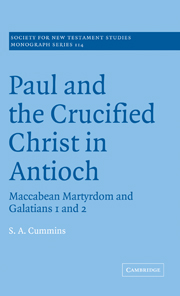Book contents
- Frontmatter
- Contents
- Preface
- List of abbreviations
- Introduction
- Part One MACCABEAN MARTYRDOM
- Part Two PAUL AND THE CRUCIFIED CHRIST IN ANTIOCH
- 3 Paul as a paradigm of conformity to Christ: the Galatian context, conceptual framework and autobiography
- 4 Jews and Christians in Antioch
- 5 Paul and the crucified Christ in Antioch: Galatians 2.11–14
- 6 Paul and the crucified Christ in Antioch: Galatians 2.15–21
- Conclusion
- Bibliography
- Index of passages
- Select index of Greek words and phrases
- Index of modern authors
- Select index of names and subjects
6 - Paul and the crucified Christ in Antioch: Galatians 2.15–21
Published online by Cambridge University Press: 22 September 2009
- Frontmatter
- Contents
- Preface
- List of abbreviations
- Introduction
- Part One MACCABEAN MARTYRDOM
- Part Two PAUL AND THE CRUCIFIED CHRIST IN ANTIOCH
- 3 Paul as a paradigm of conformity to Christ: the Galatian context, conceptual framework and autobiography
- 4 Jews and Christians in Antioch
- 5 Paul and the crucified Christ in Antioch: Galatians 2.11–14
- 6 Paul and the crucified Christ in Antioch: Galatians 2.15–21
- Conclusion
- Bibliography
- Index of passages
- Select index of Greek words and phrases
- Index of modern authors
- Select index of names and subjects
Summary
While it must remain an open question as to precisely where Paul's citation of his accusation against Peter in Galatians 2.14 ends, it is generally agreed that his pursuant remarks at Galatians 2.15–21 at least reflect the substance of the issues addressed during their Antioch confrontation. This will be borne out in the following estimation of Paul's complex and much disputed line of argumentation which, both in terms of its underlying theological framework and key constituent features, may also be the more clearly comprehended when viewed as a dramatic reworking of a Maccabean martyr model of Judaism. It is not feasible to itemize at the outset every aspect of what will prove to be an intricate summoning of various lines of evidence. However, it will prove useful if the overall shape and substance of the ensuing interpretation is briefly set forth in advance.
Paul continues to remonstrate against the position taken by Peter in Antioch by ironically appropriating a piece of intra-Jewish polemic espousing Jewish superiority over Gentiles (Gal. 2.15), which he immediately relativizes by locating it within his decidedly christological understanding of the people of God (Gal. 2.16). That is, he reminds Peter of what he already knows: a person's covenant membership – and hence vindication before God – is not a function of adherence to ‘the works of the law’ and the way of life they represent, but of conformity to the faithfulness of Jesus the Messiah.
- Type
- Chapter
- Information
- Paul and the Crucified Christ in AntiochMaccabean Martyrdom and Galatians 1 and 2, pp. 189 - 230Publisher: Cambridge University PressPrint publication year: 2001



